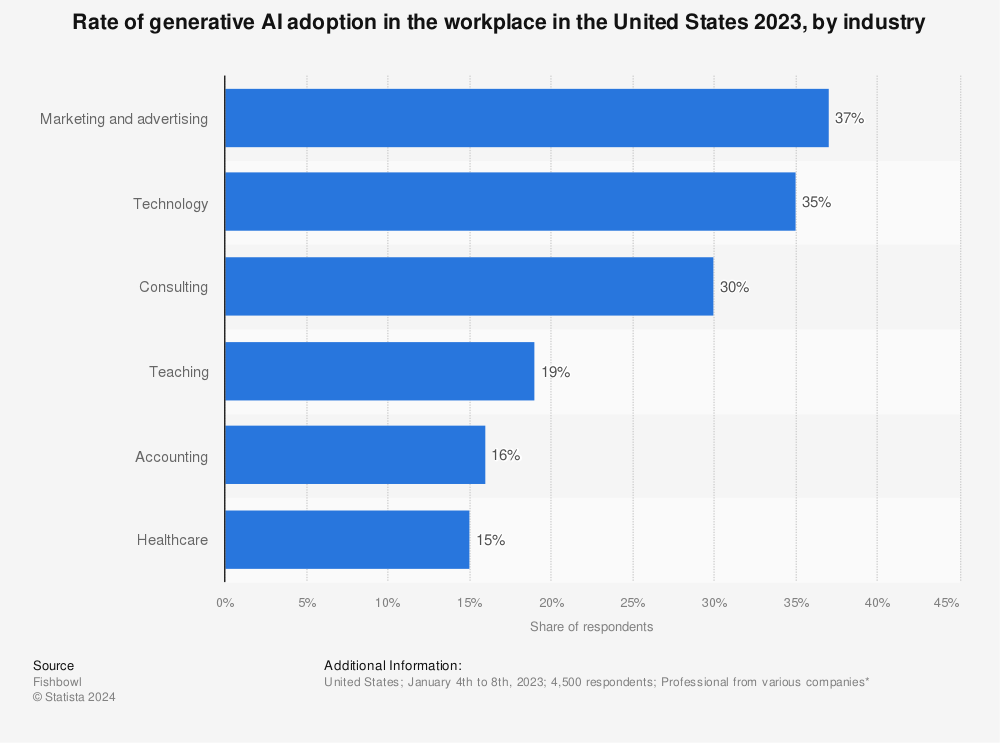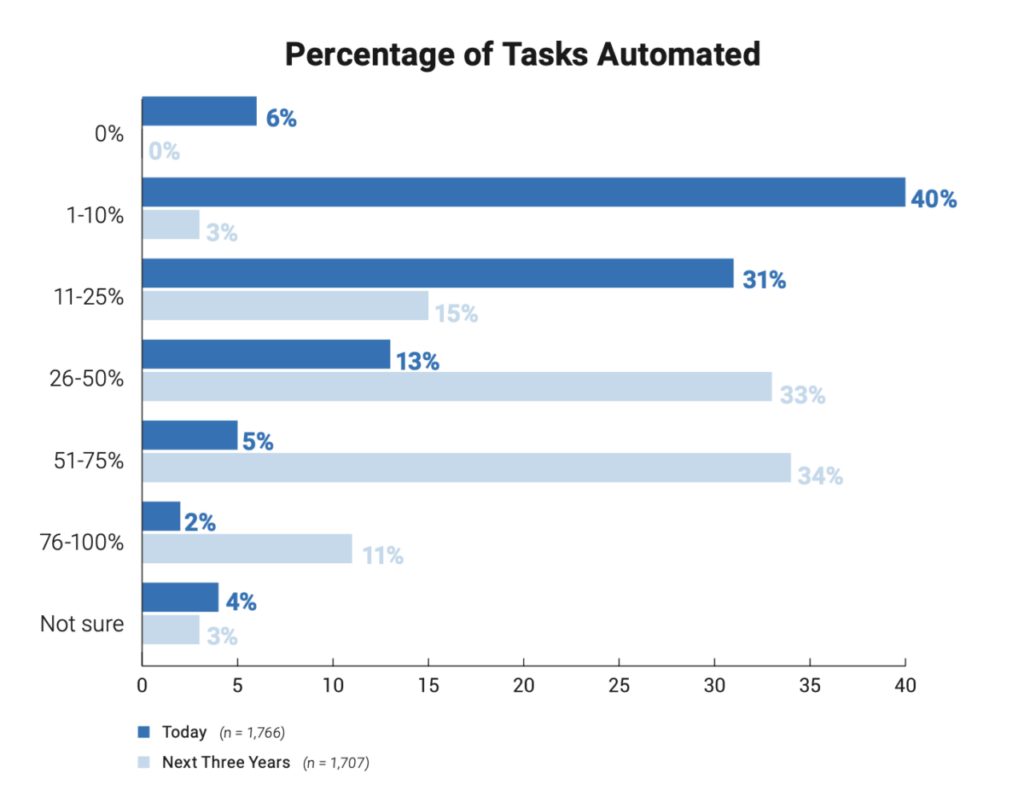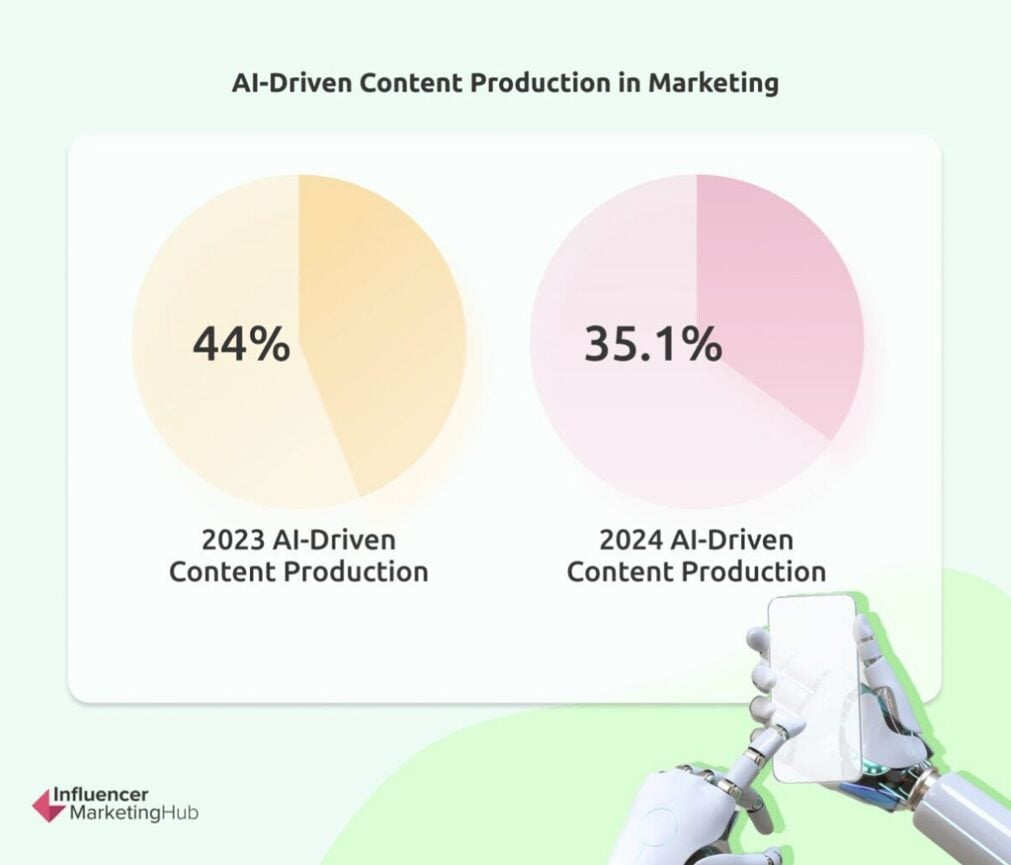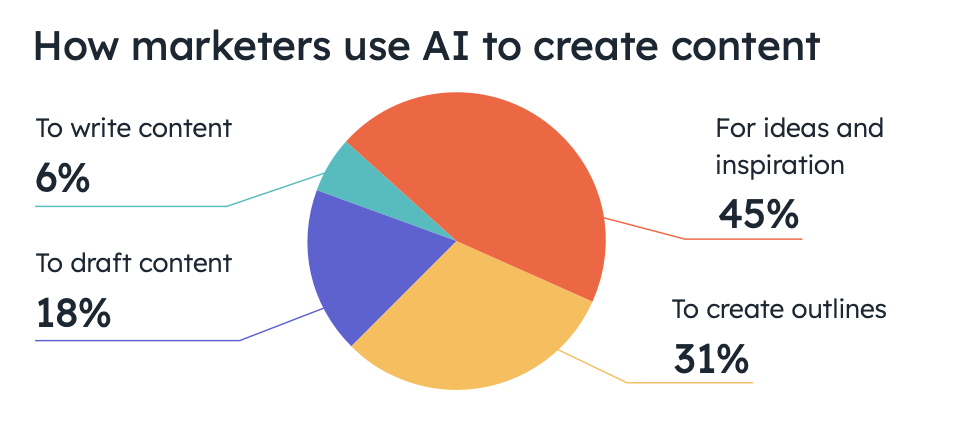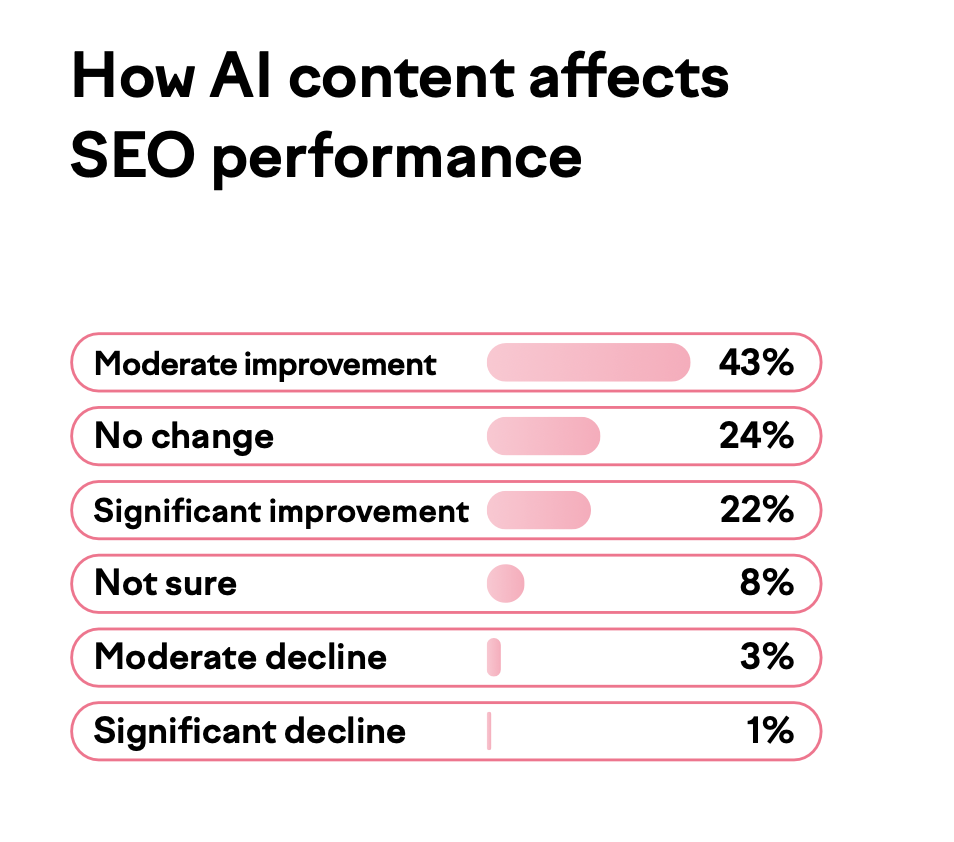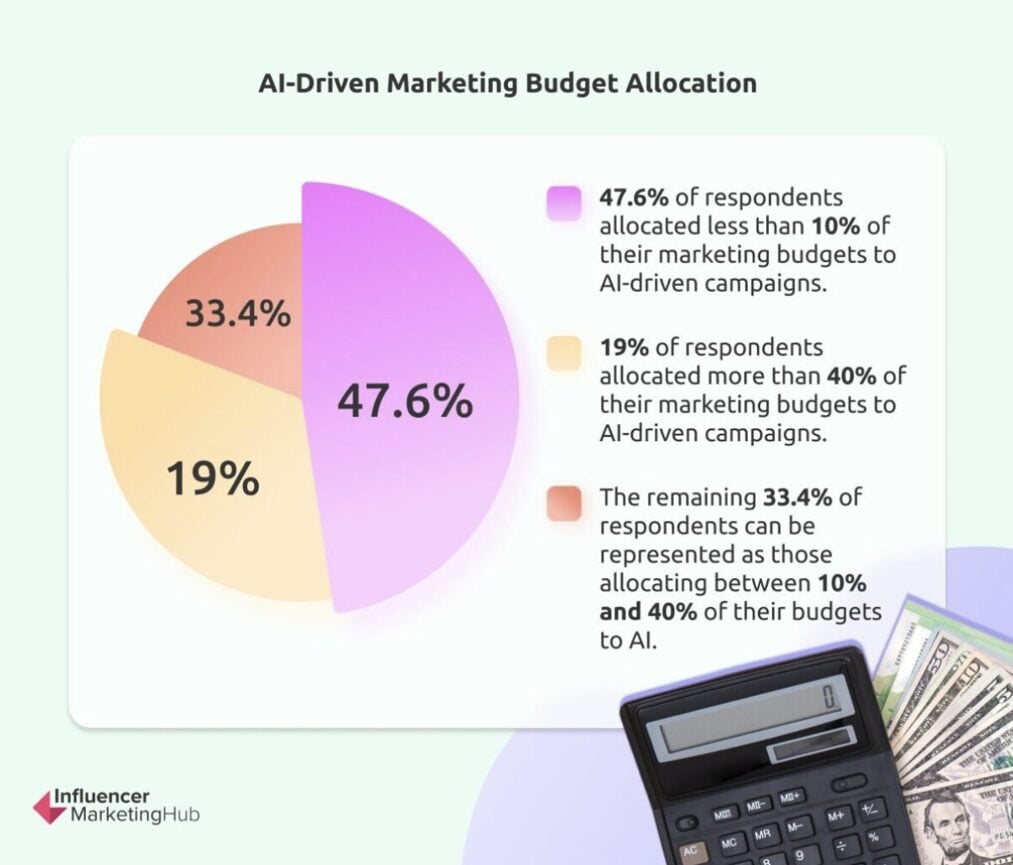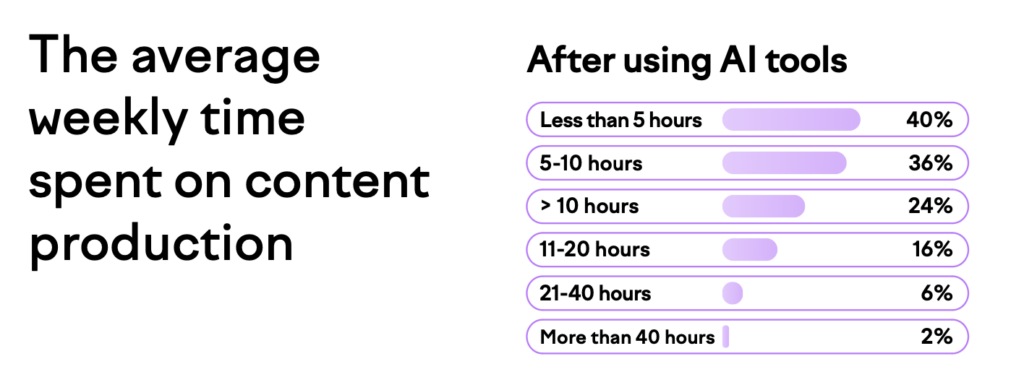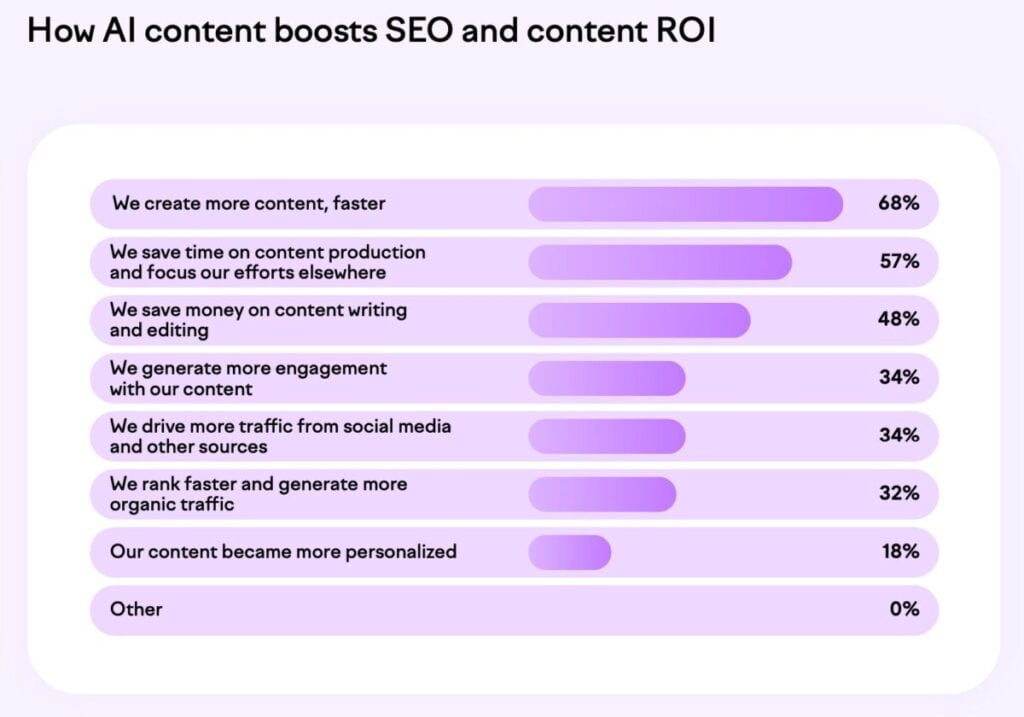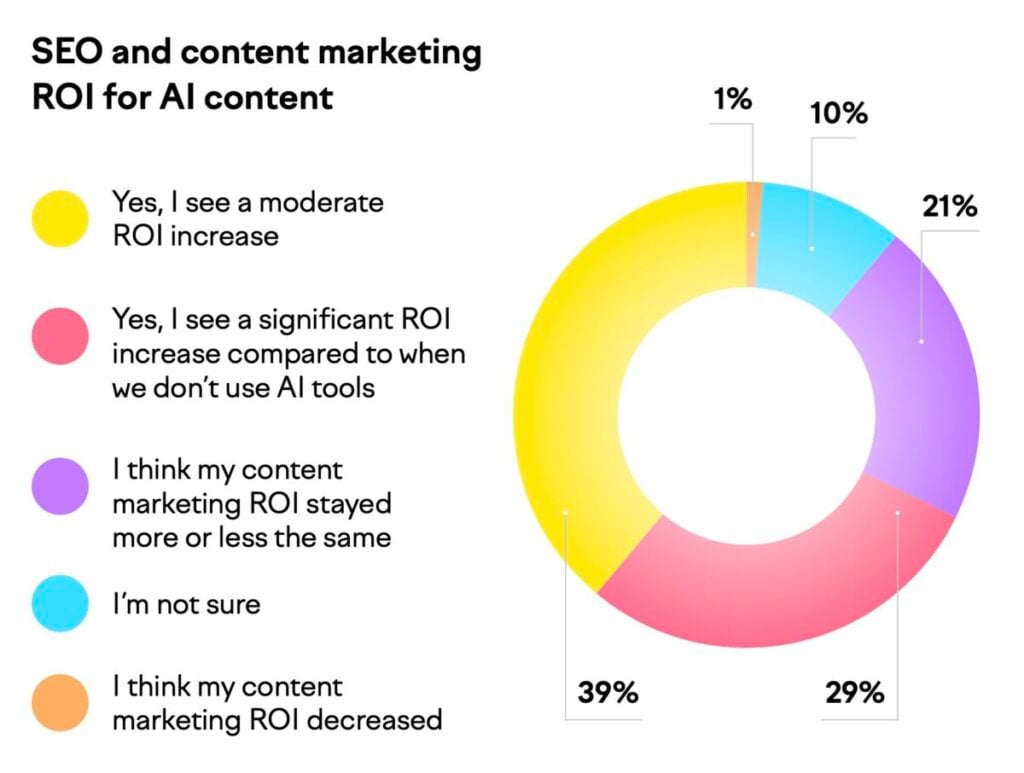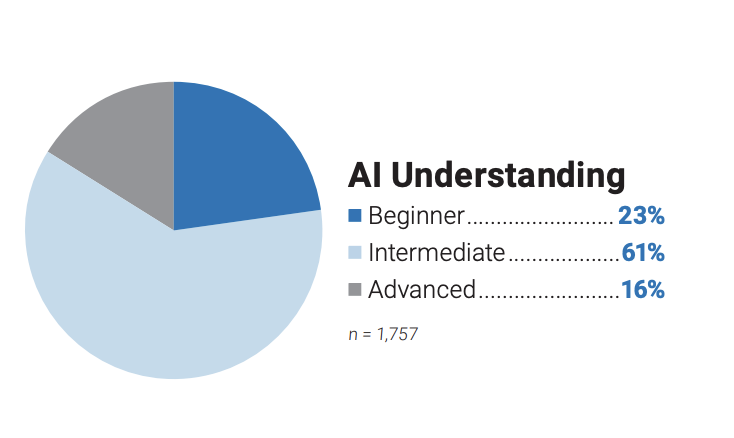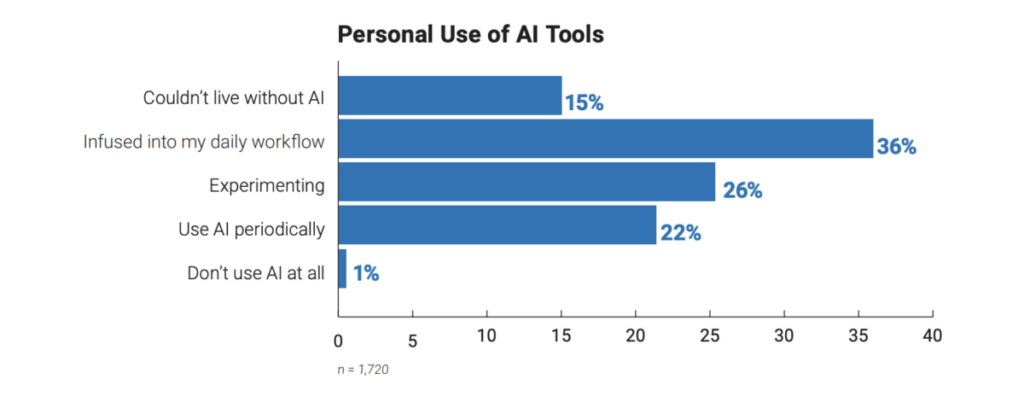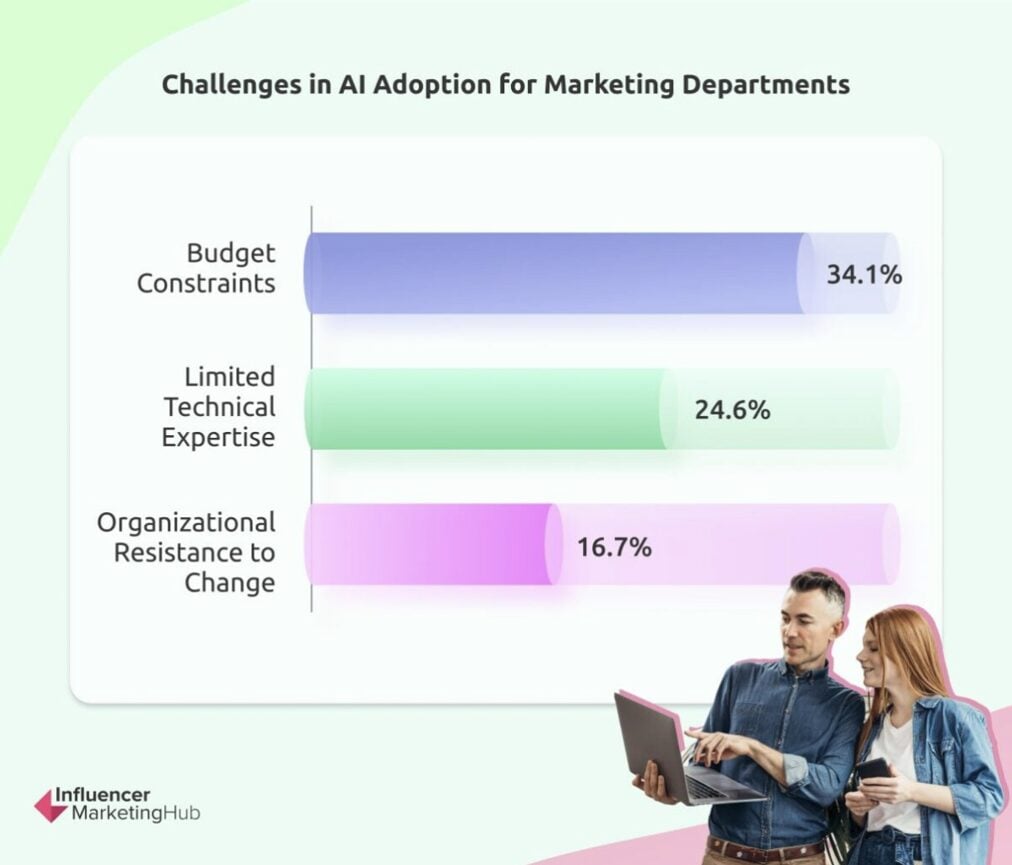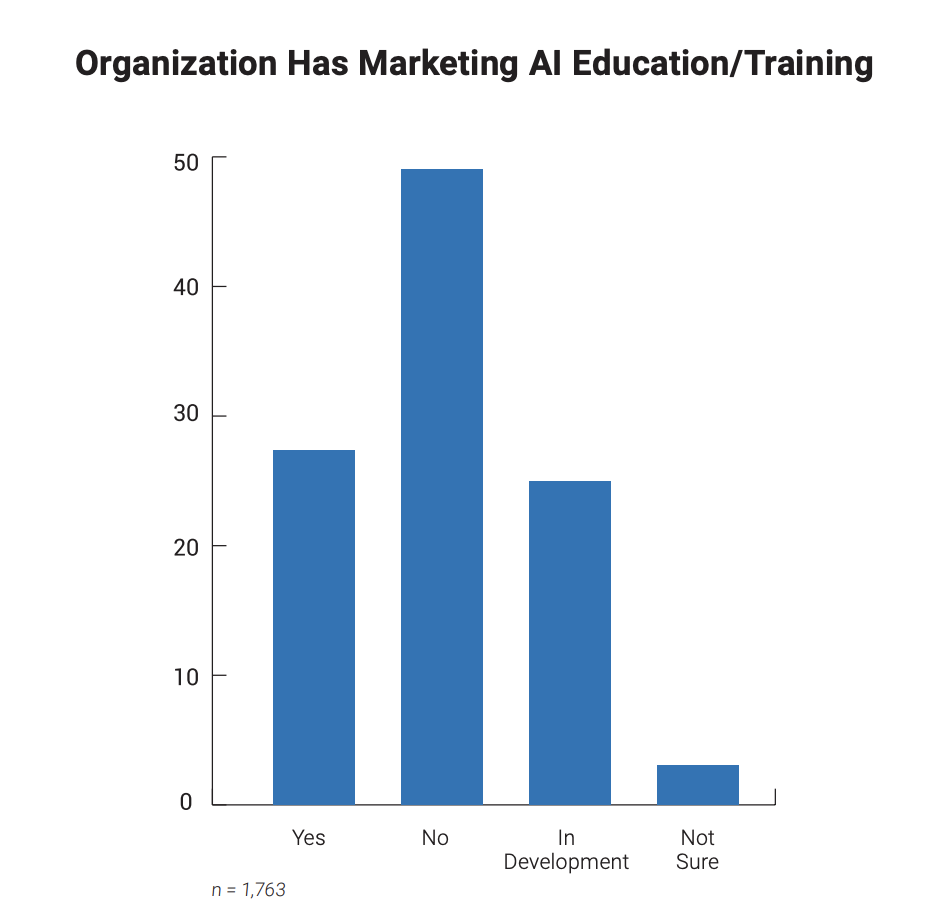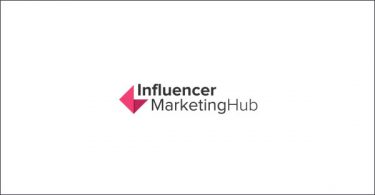Artificial intelligence (AI) is dominating conversations across various industries, especially the marketing sector. Here are over 50 AI marketing statistics that show the impact of AI in marketing specifically.
We explore statistics that indicate new trends and forecasts in AI marketing that include hyper-personalized content, predictive analytics, and generative AI. Learn how to use AI-driven insights to take your marketing game to the next level.
Top AI Marketing Statistics and How to Leverage Them for Digital Marketing
Industry Impact of AI
The use of artificial intelligence (AI) is becoming more prevalent across all industries. Most business leaders now believe that AI will be a crucial factor to the future success of any business regardless of size and industry.
These are the latest statistics that indicate its growing adoption and critical role in various industries.
1. 42% of enterprises use AI
The Global AI Adoption Index released by IBM in 2023 reveals that 42% of enterprise-scale businesses reported using AI in their processes. As much as 40% of the respondents also indicated that their companies are exploring AI and how to integrate it into their business, showing the steady growth of AI adoption.
2. Generative AI adoption is highest in marketing and advertising
A recent survey shows that the adoption of generative AI is highest in the marketing and advertising sector. Of the 4,500 respondents, 37% of those working in marketing and advertising indicated that they have used AI in their tasks. The other two sectors showing increased use of AI are technology (35%) and consulting (30%).
3. 24% of marketers at global enterprises use AI
While the marketing and advertising industry as a whole boasts high adoption of generative AI, another survey conducted by Morning Consult on behalf of IBM found that at global enterprises marketers aren’t the group most likely to use AI. When global enterprises were asked which groups in their organization are currently using AI, IT professionals topped the list.
About a quarter (24%) of marketing professionals engage with AI within enterprises.
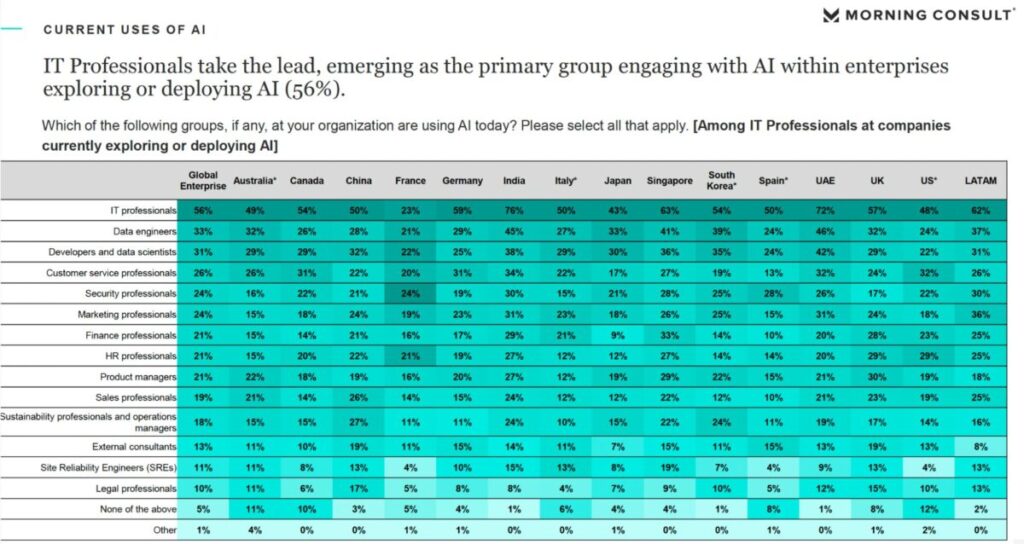
Source: newsroom.ibm.com
4. 69.1% of marketers have used it in their operations
According to our AI Marketing Benchmark Report: 2024, AI adoption might even be higher.
Unlike IBM’s survey that focused on enterprises, we interviewed marketers from businesses of all sizes.
The majority (69.1%) of marketers report that they’ve incorporated AI into their marketing strategies. What’s even more significant is that it increased by nearly 8% from 2023.
Generative AI use is even higher. A 2023 study among US marketers revealed that 73% have used generative AI tools.
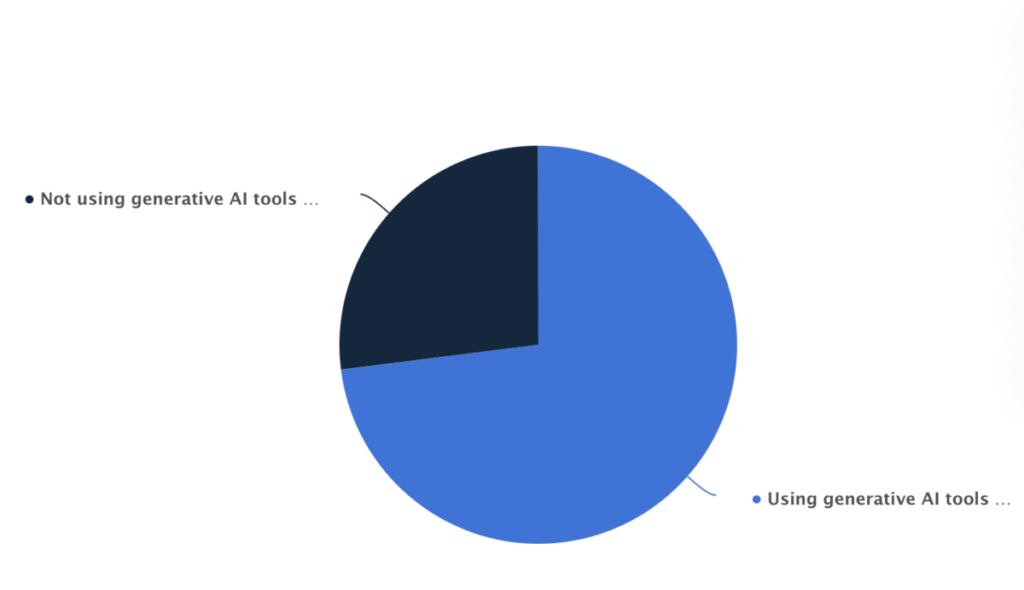
Source: statista.com
5. 89.6% of Fortune 1000 companies are increasing investments in AI
Wavestone’s 2024 Data and AI Leadership Executive Survey suggests that companies are getting more economic value from AI, resulting in increased investments in technology. Nearly 90% of the survey participants stated that they were increasing investments in AI and data.
6. In the next three years, 78% of marketers will be using AI automation in more than a quarter of their tasks
The 2024 State of Marketing AI Report compiled by the Marketing AI Institute and SalesLoft shows that 71% of marketers are already using AI automation to some degree in less than a quarter of their tasks. In the next three years, about 78% expect more than a quarter of their tasks to be intelligently automated.
With a large majority of marketers anticipating an increased application of AI-powered automation in their processes, we’re likely to see AI becoming a ubiquitous part of marketing stacks.
7. The BFSI segment held the biggest share in 2023
The recent report by Precedence Research shows that banking, financial services, and insurance (BFSI) held the biggest share in 2023. What’s more, the demand for a frictionless, round-the-clock banking service is expected to grow the industry’s current share of 17.1% significantly in the next 10 years. Account inquiries, fraud detection, and loan applications are some of the purposes for which AI is applied.
8. 42% of businesses are using AI to reduce costs
The Global AI Adoption Index 2023 shows that 42% of businesses are using AI primarily to reduce costs and automate key processes. However, the main factor that’s driving AI adoption among the companies that IBM surveyed is the fact that advances in AI tools have made these tools more accessible.
9. The Middle East and Asia are leading the way
As for which countries are taking the lead with AI tool adoption, IBM’s index reveals that organizations in India, the UAE, Singapore, and China are more actively using AI. For example, markets in India and the UAE are more than twice the size of markets in countries like Spain, France, and Australia.
The same survey found that businesses in China, India, and the UAE are also more likely to accelerate AI rollout. For example, in China as much as 85% of organizations will likely expedite the process, compared to only 40% of UK businesses.
10. AI in marketing revenue will exceed $107 billion by 2028
According to data published by Valentina Dencheva, junior researcher at Statista, the market for AI in marketing will reach a value of $107.5 billion by 2028. To put this growth into better perspective, in 2021, it was estimated at about $16 billion.
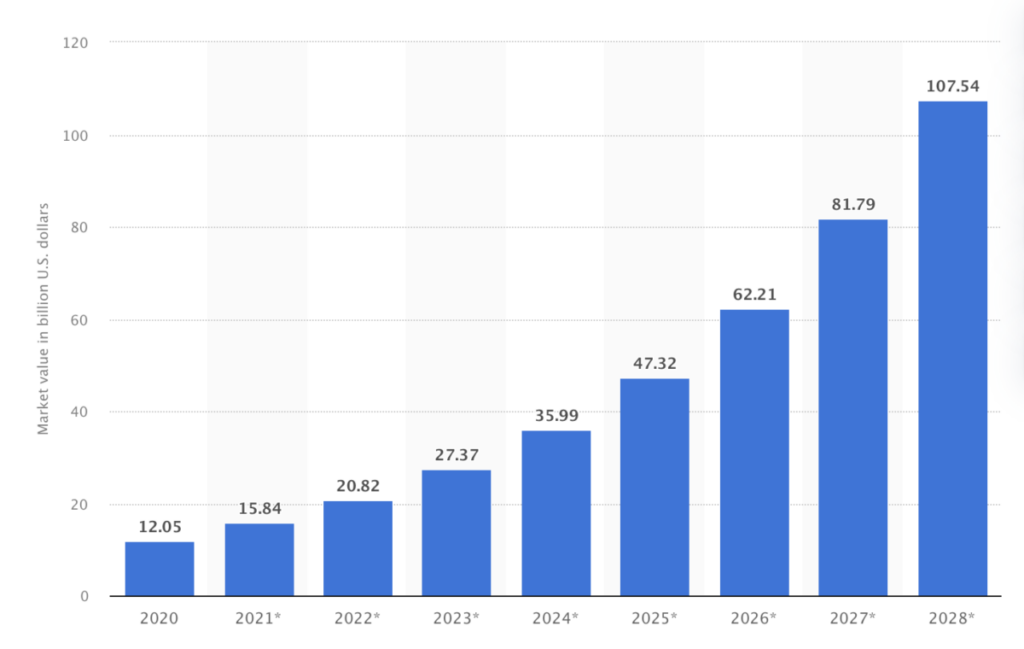
Source: statista.com
11. Half of marketers are optimistic about AI in marketing
Our AI Marketing Benchmark Report: 2024 reveals that 50.6% of the 1,290 marketers who participated in our survey feel positive about the impact that AI will have on marketing. The automation of routine tasks in particular gets them excited as well as the pace at which AI tech improves.
Key Areas Where AI Marketing Play a Pivotal Role
From AI customer data platforms to generative AI tools, AI is transforming how marketers perform their tasks. These statistics give us a glimpse of how AI marketing is revolutionizing the marketing industry.
12. 69.1% of survey respondents have used AI in their marketing operations
In a survey conducted by Influencer Marketing Hub, 69.1% of the 1,290 respondents indicated that they have used AI in their marketing operations in 2024. Of these, most have used the technology for content production.
13. 70.6% believe AI can perform certain marketing tasks better than humans
One of the likely reasons why the majority have used AI for their marketing tasks is because 70.6% believe that AI can do a better job than human marketers in certain areas. Our AI Marketing Benchmark Report: 2024 identified predictive modeling, data analysis, and content personalized as three examples of crucial areas where AI excels.
On the other hand, 32.7% believe that high-level strategy and decision-making will continue to require human input.
14. 22% of businesses are applying AI techniques such as NLP to marketing and sales
According to the IBM Global AI Adoption Index 2023, marketing and sales are among the top 10 sectors where businesses are applying AI techniques such as natural language processing, AI automation, and predictive analytics. Other sectors seeing rapid AI adoption are:
- IT processes automation (33%)
- Security and threat detection (26%)
- Business analytics or intelligence (24%)
15. Over half feel it improves data processing
In a June 2023 survey, 52% of marketing professionals in the United States using AI in their marketing programs said that the leading benefit from the use of these tools was increased speed or efficiency of processes. The same survey shows that 51% felt AI tools improved their data processing.
16. About 20% use it for customer service and ad targeting
A survey completed during March 2023 reveals that 19% of marketers use AI for customer service and support.
Advertisement targeting and analysis is an equally popular use case with 18% incorporating AI in this area. Another survey completed a few months later found that about 13% used generative AI for ad personalization.
17. 26% of global enterprises use NLP for market research
When it comes to how large organizations are using NLP, market research is one of the top five applications. More than a quarter (26%) are currently using it (or considering using it) for market research, according to IBM’s index.
18. Coding and chatbots key ways B2B marketers use AI
When it comes to B2B marketing, AI plays an equally important role in content and more technical areas like coding. Over 30% of B2B marketers in the US use AI for coding, chatbots and design. About the same percentage lists content, specifically presentations, as a leading way to incorporate AI.
The same survey found that 58% of B2B marketers are optimistic about deploying AI in 2024. About a quarter (27%) is still cautious or very skeptical.
AI in Modern Marketing Strategies
19. 42.2% have changed their strategy significantly
About four out of 10 marketers who participated in our AI marketing survey acknowledge that generative AI has significantly impacted their marketing strategies. Going forward, we predict that content creation, personalization, and customer engagement are the areas where AI will play the biggest role.
20. Most marketers use AI to align web content with search intent
A survey completed in March 2023 reveals that aligning web content with search intent is the most effective use of AI, with 84% of marketers applying it for this use case. It’s followed by enhancing the user experience (UX) with 80% of marketers listing it as the best use for AI.
21. 54.8% believe AI can impact influencer marketing positively
Our monthly influencer marketing report for July 2024 reveals that there’s a place for AI in influencer marketing. Its automation abilities in particular stand out with 54.8% of marketers feeling positive that AI can improve efficiency and personalize interactions.
July 2024’s report also found that it’s specifically useful for influencer identification and engagement. AI is driving a shift towards micro and nano-influencers who stand out for their authenticity and audience connections.
That said, the same report found that 36.7% of marketers are worried about authenticity in AI-powered influencer marketing. So, if you want to use AI for influencer marketing, ensure that you add a touch of human creativity so that your content resonates with audiences.
22. 35.1% use it for content production
According to our AI Marketing Benchmark Report: 2024, 35.1% of marketers use it for content production. It remains a popular use case, despite its decrease from 44% in 2023.
Even if AI isn’t used in the final stages of content production, it plays a key role during the planning phases. AI marketing stats shared in HubSpot’s 2024 The State of Marketing Report reveal that:
- 18% use it to draft content
- 31% use it to create outlines
- 45% use it for ideas and inspiration
23. 58% use it for blog posts
As for which type of content marketers create mostly with AI, there’s no real surprise. According to Semrush’s The State of AI 2024 Report, 58% of businesses create blog articles with AI.
It’s also used for short articles. Nearly half (49%) use it for this type of content.
24. 49% use it for email marketing
According to HubSpot’s 2024 The State of Marketing Report, 49% of marketers who use AI use it to create email content. What’s more, a survey completed among email marketers in 2023 revealed that about 51% think that AI-supported email marketing is more effective. Only about two out of 10 marketers saw no major improvement.
25. About a third use it to create videos and images
Using AI for written content isn’t the only way that marketers use it to stay relevant. According to Semrush’s data, 31% of businesses use it to create short videos, while 18% use it for long videos. More or less the same percentage (28%) use it for images.
26. 21% of creators use AI for editing
AI is also being used during the final stages for content creation—editing. In 2023, a survey revealed that 21% of U.S. content creators used AI for editing purposes.
27. 65% have seen their SEO results improve
In addition to content marketing, AI is also helping marketers to improve their SEO strategies. Semrush’s The State of AI 2024 Report reveals that 22% of respondents have seen a significant improvement in SEO performance, while 43% have seen a moderate improvement.
28. 54% of businesses use AI to create personalized consumer experiences
More than half (54%) of respondents to Marketing AI Institute’s 2024 State of Marketing AI survey indicated that the main outcome they want to achieve with AI is to create personalized consumer experiences at scale. To help them do this, 41% also use it to predict consumer needs and behaviors more accurately.
AI and Social Media
29. Increased efficiency is the main benefit of using AI in social media marketing
Just like with digital marketing in general, efficiency is also a primary benefit of using AI for social media marketing. A global survey completed in May 2024 reveals that 38% of marketing professionals list improved efficiency as the leading benefit.
Other benefits and reasons for leveraging generative AI for social media marketing include:
- Simplified idea generation
- Increased content production
- Improved creativity
- Reduced costs
30. Over half create social media posts with AI
After blog posts, social media content is the most common type of content that businesses create with AI. According to Semrush’s numbers, 55% of businesses are creating social media posts with the help of AI.
31. 42% use it for social media captions
According to CreatorIQ’s 2023-2023 Creator Marketing Trends Report, 42% of marketing managers and execs that use AI for daily tasks use it for social media captions.
32. Over 90% find TikTok’s Symphony AI tools attractive
Launched in June 2024, TikTok’s Symphony AI tools offer a suite of features to help marketers and creators with content creation. It has only been available for a few months but already marketers are taking notice.
Our TikTok Marketing Report 2024 reveals that only 8.1% of marketers find no attraction in TikTok’s Symphony AI tools.
Just over a third (36.5%) find it extremely attractive while an extra 37.8% describe it as very attractive.
33. Nearly a quarter predicts that AI will be used more for TikTok ad delivery
Our TikTok Marketing Report 2024 also reveals that after eCommerce integration, the second biggest prediction for the evolution of TikTok marketing is the increased use of AI. Automation and AI will be used in particular to improve ad delivery and personalization, with 22.7% listing it as their prediction.
34. More than 75% will likely integrate Symphony AI-generated avatars
In addition to ad delivery, there’s also a strong interest among marketers in using AI for content creation. More than half of marketers (51.9%) will very likely use Symphony AI-generated avatars and an additional 26% are likely to try it, as per our TikTok Marketing Report 2024.
35. Snapchat’s My AI has been used to send over 10 billion messages
Similar to TikTok, Snapchat is another social media platform that’s standing out when it comes to AI innovation. Its AI-powered chatbot, My AI, ended its first year as the third-favorite AI-powered tool in the United States. About a third (36%) of respondents picked Snapchat’s My AI as their preferred AI tool.
It’s been used to send over 10 billion messages within the first few months.
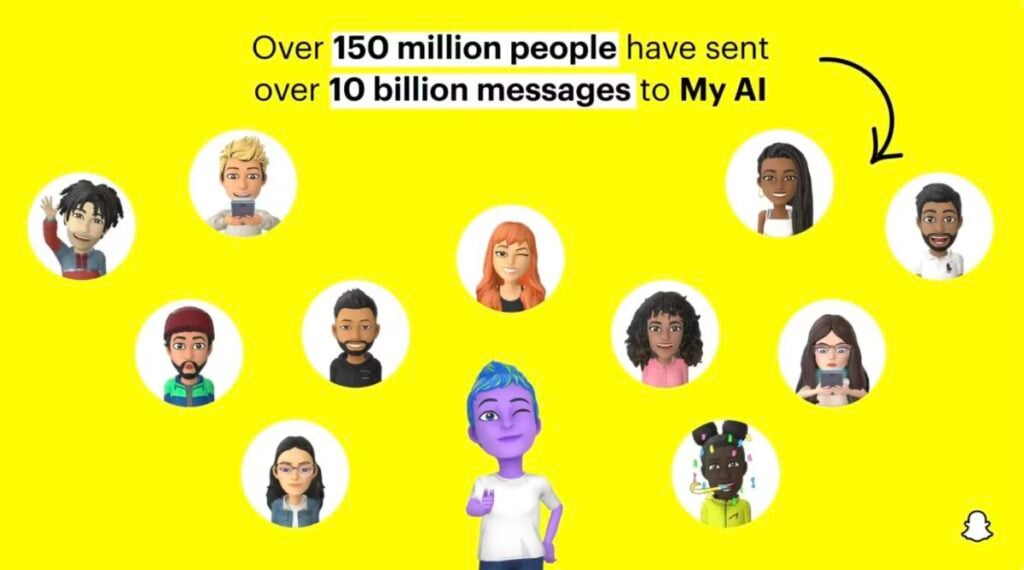
Source: newsroom.snap.com
36. 70% of LinkedIn subscribers have tried its AI tools
According to LinkedIn’s early data, 70% of its subscribers with access to the platform’s new AI tools have tested them out. What’s even more impressive is that 90% of those subscribers reported finding these tools useful.
How AI Marketing Tools Are Transforming Small Businesses
37. 67% of small businesses are using AI tools
Semrush’s The State of AI 2024 Report interviewed over 2,600 businesses, of which 76% were micro-businesses or small businesses, to gain insight into how they’re using AI for their content marketing and SEO. According to their data, a massive 67% of these businesses are already using AI for content marketing or SEO.
38. Over half of small businesses not using AI currently are open to reconsidering it
When Semrush asked small businesses that weren’t currently using AI if they would reconsider it in the future for content marketing, 57% indicated that they would reconsider their choice. About a third (34%) were unsure, while only 9% wouldn’t reconsider.
The top three factors that will get them to change their minds are:
- Social proof of AI-generated content’s ability to rank
- Improvement in user-friendliness
- Cost reduction
Another survey completed in the US in June 2023, also revealed cost as a factor for SMBs being hesitant about using AI for marketing. About four out of 10 listed this as their biggest concern. However, the biggest worry was about data security with 44% identifying it as their source of concern.
39. 28% of small businesses expect to save $5,000 with AI
About 28% of SMBs indicated in a survey completed in the US in June 2023 that they anticipate that AI will help them save at least $5,000 in the next year. Slightly more (30%) expect to save anything between $1,000 and $4,999.
40. Nearly half dedicate less than 10% of their budgets to AI
Our AI marketing report that interviewed 1,290 marketers, of which the majority work at small and medium-sized companies, reveals that 47.6% dedicate less than 10% of their marketing budget to AI-driven campaigns. Only 19% allocate over 40% of their budget to AI-powered campaigns.
41. AI has helped 40% of businesses to reduce time spent on content to less than 5 hours
As mentioned previously, AI is having a massive impact on efficiency. According to Semrush’s report, 40% of businesses have reduced the time they spent on content to five hours per week with the help of AI. Before incorporating AI, only 16% of businesses managed to cap it at less than five hours.
For example, before using AI, about half of businesses spent at least three hours on average writing a long-form blog post. Now, with the help of AI, 36% spend less than an hour on average.
Nearly 60% of these businesses can use the time they’ve saved to focus their efforts on another area.
42. 82% of businesses using AI rate their content marketing as very effective
For small businesses, the good news is that saving time doesn’t have to be at the expense of effectiveness. Semrush’s data reveals that 82% of businesses that are using AI tools for SEO or content marketing rate their efforts as very effective. On the other hand, only 18% of small businesses that don’t use AI feel the same.
43. Nearly 70% saw an increase in ROI
Not only would businesses rate their marketing efforts as more effective with the help of AI, but it has also improved their return on investment (ROI). Semrush reports that 68% of businesses saw an increase in ROI in content marketing and SEO. What’s more, nearly half of these (29%) report seeing a significant improvement.
44. 78% are satisfied with their AI tools
Results aside, the vast majority of businesses that participated in Semrush’s survey are also satisfied with their AI tools. About a third were very satisfied, while an additional 46% were satisfied.
Only 2% rated their experience as unsatisfactory.
Barriers to AI Adoption in Marketing
While the use of AI has now become more prevalent, there are challenges that hamper its large-scale adoption in the field of marketing. Here are some statistics on the barriers that slow down AI marketing.
45. 23% of marketers consider themselves beginners when it comes to AI marketing
A factor that holds back the adoption and implementation of AI in marketing is the lack of AI knowledge and capabilities.
The 2024 State of Marketing AI Report found that nearly a quarter (23%) of marketers would rate their understanding of AI terms and AI capabilities at a beginner level. This seeming lack of confidence sets an obstacle to achieving real-world outcomes with AI marketing.
That said, it has significantly improved since last year. In 2023, 35% rated themselves as beginners. Also, 5% more marketers indicated that they have an advanced understanding.
As you would expect, entry-level employees are more inclined to say they have a beginner-level understanding. On the other hand, 23% of CMOs classify their level as advanced.
Yet, 51% of marketers use AI basically daily. About a third (36%) say that the personal use of AI tools is infused into their daily workflow, while 15% couldn’t live without it.
In 2023, 45% were only experimenting with it. So, it would be interesting to track how marketers’ understanding develops as increasingly more are starting to use it regularly.
46. Only a third of marketers feel very confident about evaluating AI tech
While the vast majority (84%) of respondents to Marketing AI Institute’s survey are involved in researching, recommending, and/or deciding which AI tech to purchase for marketing purposes, only 35% feel very confident in evaluating solutions. Nearly half (48%) rate their confidence at a medium level, while 16% feel it’s low.
As you would expect, those who also have a limited understanding of AI are also the ones who feel less confident in evaluating different tools.
47. 67% of marketers say that lack of education and training is the biggest barrier to AI adoption in marketing
While about 1 out of 3 marketers fear AI, the biggest barrier to AI adoption is apparently the lack of education and training, not fear. In the 2024 State of Marketing AI Report, 67% of the respondents aren’t adopting AI because they feel that they don’t have enough knowledge and training to use the technology. This was also the top barrier in 2023.
About half (56%) also say that the lack of awareness of the capabilities and use cases of AI is stopping them from implementing the technology in their marketing processes. Other barriers cited in the survey are:
- Inadequate talent pool
- Lack of strategy
- Lack of resources
Interestingly, according to the Marketing AI Institute, significantly more marketers feel that they have fewer resources this year, compared to 2023. In fact, our research found that a third (34.1%) feel budget constraints are the biggest obstacle to AI adoption.
48. Only 26% of marketers say their companies have internal AI-focused education and training
Marketing AI Institute’s report reveals that nearly half (47%) of organizations offer no internal training to their marketers. About a quarter (24%) is busy developing training.
This is in line with our own research that reveals 27% of organizations offer AI training courses. What our AI marketing stats also reveal is that about a third of organizations are outsourcing training. Entrusting it to AI tech providers or consultants is pretty much equally popular with 16.7% collaborating with tech providers and 15.9% hiring AI experts.
This inadequacy in training is likely the primary cause of low confidence in the application of AI tools.
Cost could be a factor as to why a significant number of organizations still don’t offer training. The same survey found that companies with higher revenue were nearly twice as likely to have training.
49. 69.8% have faced technical challenges
Whether it’s due to a lack of training or just a steep learning curve, the majority of marketers who participated in our survey admit that they’ve encountered technical challenges. This underscores the importance of offering some form of training to your team.
50. About 2 out of 5 marketers worry about consumer mistrust
Content generation is one of the key areas where AI is used. However, our monthly influencer marketing report for July 2024 found that 19% of marketers are concerned that potential customers will mistrust AI-generated content. Our report suggests that marketing teams can combat this by being transparent about how they use AI in content generation.
51. 42% are worried about originality
When AI is specifically used for content production, the main concern is that the content won’t be original. About four out of 10 businesses that Semrush surveyed listed that they’re worried that the content won’t be original.
Adding to that, 36% found it challenging to incorporate their brand’s voice while 10% cited that they’re worried their target audience won’t find the content relevant.
AI Has a Significant Impact on the Future of Marketing
Today, AI is already revolutionizing the marketing industry, and it is expected to continue doing so in the next few years. It will have significant impact in marketing automation, content hyper-personalization, predictive analytics on customer behavior, real-time insights on customer data, and search optimization, among many other elements in marketing.
Once barriers to adoption are overcome, we will likely see more businesses successfully implementing AI marketing to boost growth.
Frequently Asked Questions
What are the benefits of AI for marketing?
When used in marketing, AI brings a host of benefits that include but aren’t limited to automating marketing tasks, creating and optimizing marketing content, predicting customer behavior, analyzing customer data, generating real-time analytics, and improving efficiency in almost every process. By leveraging AI, marketing professionals can make data-driven decisions that allow them to maximize outcomes in every campaign they run.
How can AI be used in marketing?
AI can be integrated in every aspect of marketing. In campaigns, they can be used to enhance every process from end-to-end. Some of the most effective uses of AI in marketing are in tasks that involve large amounts of data. These include ad targeting and analysis, predictive marketing analytics, email marketing, content moderation, social media listening, and conversational customer experiences.
What ethical concerns of AI should digital marketers be aware of?
While AI brings a plethora of benefits, digital marketers must be aware of ethical concerns that surround the use of AI in marketing. These include, but are not limited to, biases in algorithms, the misuse of customer data, privacy concerns, disinformation, and disregard of user preferences. To build trust with customers, businesses must ensure that they are not violating any of their customers’ rights as they use AI in marketing.
How can businesses effectively use AI insights in their marketing strategies?
By effectively integrating AI insights into marketing strategies, businesses can enhance customer experiences, optimize campaigns, and drive significant growth. To help collect and centralize data, businesses can use tools like Google Analytics, social listening platforms or CRMs. They can then use an AI-driven platform to automate segmentation and improve targeting to deliver tailored content like personalized product recommendations.
Is AI-driven marketing more cost-effective?
The answer largely depends on your business size, goals, and current marketing infrastructure. For many organizations, the long-term savings and efficiency gains make AI a worthwhile investment. However, it's crucial to weigh the initial costs and potential challenges. If leveraged correctly, AI-driven marketing can provide a competitive edge, driving higher ROI through automation, personalization, and data-driven insights.
How effective are AI-generated images for digital marketing campaigns?
AI-generated images hold significant potential for digital marketing campaigns. They offer cost savings, scalability, personalization, and innovation, making them a valuable tool for marketers. For example, AI-generated images can be personalized to match a recipient’s preferences, making email marketing campaigns more effective. However, it’s essential to approach this technology with caution, ensuring quality control and ethical considerations are in place.
